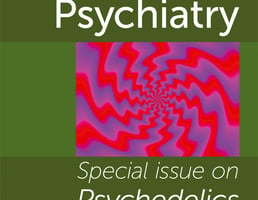Guardrails Needed to Control Promotion, Off-label Use of Psychedelics

Psychedelics such as 3,4-methylenedioxymethamphetamine (MDMA) and psilocybin have shown promise for the treatment of such psychiatric disorders as posttraumatic stress disorder and depression. But any FDA approval of psychedelics will almost certainly lead to substantial off-label use as well, cautioned medical ethicists in a Viewpoint piece in JAMA Psychiatry.
“With high public enthusiasm, extremely bullish investors, and hundreds of newly established brain wellness clinics, all the pieces are now in place for expansive off-label promotion and use of psychedelics to quickly mushroom beyond what is safe,” wrote Anna Wexler, Ph.D., and Dominic Sisti, Ph.D., both of the University of Pennsylvania Perelman School of Medicine. “[R]egulators, policymakers, and health authorities must carefully examine and create guardrails for the promotion and off-label use of psychedelics.”
The authors pointed to several issues that they believe will arise with any approval of MDMA and/or psilocybin:
- Clinics will likely overhype and advertise psychedelics for the treatment of conditions in the absence of scientific evidence.
- Health care professionals may lack relevant training to competently treat patients with psychedelics and/or those without any medical training may offer psychedelic treatments.
- Clinics may not have the staff to competently guide patients through psychedelic sessions.
- Off-label protocols and dosing practices will likely vary, complicating attempts to assess the efficacy of MDMA and psilocybin for nonapproved indications.
Ketamine is already being used off label for “wellness” and “inner exploration,” the authors wrote. Many of these clinics will be ready to offer other psychedelics once they are approved by the FDA.
The authors noted that the U.S. Federal Trade Commission, state attorneys general, and state medical boards all have a role to play in intervening if clinics make misleading claims about the efficacy of psychedelics for off-label indications, physicians inappropriately prescribe psychedelics, and/or people practice medicine without a license. Additionally, they encouraged policymakers to fund the development of registries to track outcomes, adverse events, patient complaints, and feedback about psychedelics as well as trials of off-label or alternative clinics.
“While off-label use may be a useful way to provide access to promising treatments, it must be done responsibly and with an eye toward future evidence-based advancements in medical science,” Wexler and Sisti concluded.
For related information, see the Psychiatric News articles “The Return of Psychedelics: A Measured Approach” and “The Return of Psychedelics: Still Time to Prevent Tragedy.”
(Image: iStock/Pornpak Khunatorn)







